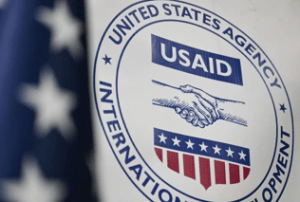By Ephraim Ofori NUMOSUOR
Ghana would not be spared in the ongoing freeze on the USAID by President Donald Trump. The country is grappling with a US$156 million funding shortfall following the freeze of the aid support.
However, instead of relying on other sources of foreign aid or imposing new taxes, the country has an opportunity to pursue innovative and self-sustaining solutions to close the gap.
In response, the President has tasked the finance minister with identifying strategies to mobilize resources and strengthen economic resilience. Below are some practical, achievable approaches that leverage on Ghana’s resources, infrastructure, and economic potential to step up additional revenue for bridging this gap.
Monetizing state-owned idle assets
The government owns vast amounts of land, buildings, and facilities that remain underutilized. A comprehensive asset audit can identify properties suitable for leasing or commercial partnerships. For instance, unused government buildings can be leased to private enterprises, educational institutions, or tech startups to generate consistent revenue.: Even high-value properties can be used as asset-backed securities to issue bonds to raise immediate capital.
Expanding the digital economy and e-commerce
Ghana’s digital economy is growing, yet remains underutilized. The government can boost revenue by investing in digital platforms for trade, financial services, and remote work opportunities. Expanding government-backed e-commerce initiatives and digital payment platforms can help capture untapped economic activity and bring more transactions into the formal economy, increasing revenue from existing sources like business registration fees and service charges.
Public-Private Partnerships (PPPs) in infrastructure and services
Rather than solely funding major infrastructure projects, the finance minister should deepen the adoption PPP models where private investors finance and manage public projects in exchange for revenue-sharing arrangements. This approach is already being used in road tolling and power generation in some other countries but it can be expanded to healthcare, transportation, and waste management services to reduce government spending and increase efficiency.
Commercializing agriculture for export
Ghana’s agriculture sector holds immense untapped potential. With 13.6 million hectares of land classified as agricultural land and 4.7 million hectares as arable land, encouraging commercial-scale farming and agro-processing for export can generate significant foreign exchange earnings. The government can facilitate value chain development by providing logistics support, storage facilities, and market linkages for cocoa, cashew, shea butter, and horticultural products, driving increased export revenue.
Leveraging natural resources through value addition
Ghana is rich in gold, oil, bauxite, and other natural resources, yet exports them largely in raw form. By investing in refining and processing industries domestically, the country can capture more value and increase revenues. Encouraging local refining of crude oil, smelting of bauxite into aluminium, and gold processing before export can create jobs and boost government income through licensing and royalties.
Optimizing State-Owned Enterprises (SOEs) for profitability
Many Ghanaian SOEs operate inefficiently and run at a loss. The auditor general’s report indicated that most of SOEs are not profitable. Implementing corporate governance reforms and performance-based incentives can turn them into profit-making entities. The government can also explore partial privatization of some SOEs to improve efficiency while maintaining strategic control, generating funds for public spending.
Enhancing the creative and entertainment industries
Ghana’s music, film, and fashion industries have international appeal but remain underfunded. Creating structured investment in these sectors, including government-backed grants and private-sector collaboration, can drive revenue through exports, streaming services, and international concerts. The government can also facilitate copyright enforcement and monetization of Ghanaian creative content globally.
Instant payment system for traffic fines
Ghana can implement a technology-driven traffic enforcement system to instantly fine motorists who break traffic rules, such as running red lights or over speeding. Smart cameras installed at key intersections will capture violations and automatically generate e-tickets linked to the motorist’s DVLA records and mobile number. Offenders will receive instant notifications via SMS, email, or a mobile app, allowing them to pay fines immediately through Momo, bank apps, or QR codes.
To ensure compliance, unpaid fines will result in penalties such as increased charges, blocked vehicle registration renewals, or alerts to law enforcement. With this system, traffic police will also be equipped with smart handheld devices to check for unpaid fines and facilitate on-the-spot payments. This technology-driven approach will improve compliance, reduce corruption, enhance road safety, and boost government revenue.
Expanding Industrial Zones and Special Economic Areas
Industrialization remains a game-changer for revenue generation. Establishing and expanding special economic zones (SEZs) with incentives for manufacturing and technology firms can increase exports, create jobs, and attract foreign direct investment. A focus on automobile assembly, textiles, and electronics can drive long-term economic growth.
Maximizing remittances and diaspora investments
Ghana’s diaspora sends billions in remittances annually, but much of it remains informal. Introducing structured investment vehicles, such as diaspora bonds and real estate investment trusts (REITs) targeting Ghanaians abroad, can channel these funds into productive sectors. A government-backed digital remittance platform can also help formalize and increase inflows.

Conclusion
In conclusion, Ghana’s ability to bridge the US$156 million funding gap does not require external aid or higher taxes. The freeze on USAID funding should be seen as a wake-up call for African nations to become more self-reliant and develop homegrown solutions for economic growth and social development. The key lies in efficiency, innovation, and strategic investment in high-growth sectors that drive long-term prosperity.
>>>the writer is a Financial Economist, Research and Policy Analyst. He can be reached via [email protected]
Sources
The write-up is based on a mix of real-world economic strategies, Ghana’s current financial landscape, and common-sense approaches that have worked in other countries. I didn’t pull it from one single source but rather drew from:
- Ghana’s reality, looking at the country’s budget reports, economic policies, and the general state of industries like agriculture, tourism, and natural resources.
- Successful Strategies Elsewhere. Countries like Rwanda, Kenya, and even some Asian economies have used things like public-private partnerships (PPPs) and industrial zones to boost their economies without relying on aid or raising taxes.
- Basic Economics & Business Logic. If Ghana has untapped state assets, underutilized industries, and a growing digital economy, why not leverage them to raise funds instead of just waiting for foreign help?
- Common Sense Thinking. Instead of always borrowing or taxing people more, why not improve what we already have, make government-owned businesses profitable, and attract investment from our own diaspora?
So, no, this isn’t copied from a single book or report—it’s a blend of experience, economic principles, and practical thinking tailored to Ghana’s current situation.










